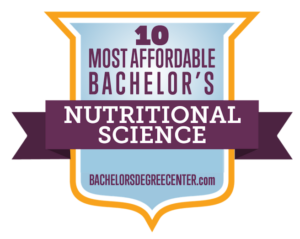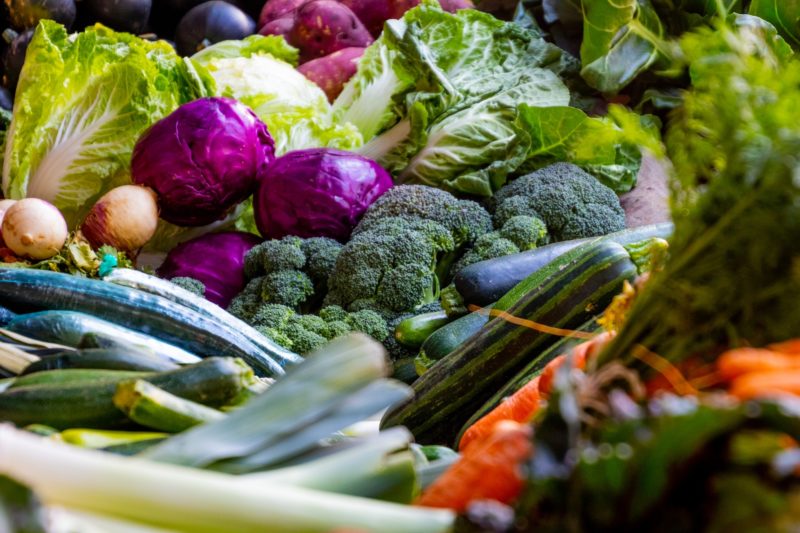
Key Information:
- CAL State LA and Indiana State University are two top schools for an affordable nutritional science bachelor’s degree.
- The programs offer various specializations such as nutritional science, dietetics, and food science.
- These programs provide comprehensive training, including coursework and extensive practical experience, preparing students for careers as registered dietitians and nutritionists.
- Many programs emphasize community engagement and public health, training students to educate and improve health outcomes in their communities.
Is nutrition and dietetics a good career? Is becoming a registered dietitian worth it? According to the Bureau of Labor Statistics, nutrition as a field is expected to grow by 7 percent from 2022 to 2032. The public demand to promote health and wellness continues to rise, especially as the baby boomer generation ages and becomes more vulnerable to disease. Nutrition is effective as a preventative healthcare measure, stopping disease and further medical problems longer down the line.
Both nutritionists and dietitians can expect a rewarding career; a nutritionist salary and dietitian salary are generally much higher than average, and enterprising, entrepreneurial nutrition experts can make a great living as consultants or in private practice. But is becoming a registered dietitian worth it? In addition to a bachelor’s degree and 1200 hours of clinical experience, the RD exam is notoriously challenging. A mound of college debt from an expensive program may tip the scales against becoming an RD, but a degree from an affordable, low-tuition program — that’s an investment with a real return. That’s why Bachelor’s Degree Center has ranked the 10 Most Affordable Nutritional Science Bachelor Programs.
Methodology: Ranking the Most Affordable Bachelor Degree in Nutrition and Dietetics
Ranking the most affordable nutritionist degree programs is a relatively straightforward task. Bachelor’s Degree Center editors began with a broad look at all of the Accreditation Council for Education in Nutrition and Dietetics (ACEND) accredited nutrition and dietetics programs in the US. That is a crucial baseline assuring students that any program they choose will provide the fundamentals for a nutrition or dietetics career.
For ordering the ranking, though, only one factor really matters: cost. Programs are ranked from lowest tuition to highest. On-campus and online programs are both included.
1. California State University, Los Angeles

The California State University, Los Angeles BS in Nutritional Science is the most affordable nutritionist degree program in America. This affordable program understands that all individuals have a right to healthy food and education about good nutrition. In Cal State LA’s bachelor degree in nutrition and dietetics, students are given a strong foundation in many areas such as medical and community nutrition and foodservice. They are taught that good nutrition is important for individuals to end chronic disease and reach the best health possible.
CSU believes their students should participate in community engagement and expand their knowledge by working on projects outside of the classroom to help members of the public. Cal State LA brings this spirit to it nutritional science programs. Students learn to analyze the science of nutrition and create accessible messages for the community. The BS in Nutritional Science readies students for employment in fields like food technology, food science, and foodservice administration.
Degree: BS in Nutritional Science
Click here to learn more about the nutrition degree program!
2. Indiana State University

Indiana State University’s affordable BS in Food and Nutrition, with a coordinated Dietetics program, stands behind their mission to teach while maintaining a commitment to inclusion, community, and public service. They support their learning environment by offering a bachelor degree in nutrition and dietetics is limited to 16 students per class. Students are required to study food and nutrition coursework and over 1200 hours of practice experience in various settings like hospitals, food service facilities, and nursing homes.
ISU’s nutritionist degree provides students with a traditional classroom setting, including lab work and supervised practice giving them the experience needed for employment. They receive coursework over varied disciplines including biology, chemistry, and management. Students can sit for the registered dietitian exam upon graduation. Job opportunities continue to increase for these students in fields like university foodservice, military food service, acute care facilities, and private organizations. A strong job market presence and low tuition make Indiana State a solid value.
Degree: BS in Food and Nutrition — coordinated Dietetics program
3. Youngstown State University

Youngstown State University’s affordable BS in Applied Science in Dietetics readies students for employment in food and nutrition as a Registered Dietitian Nutritionist (RDN). Coordinated Bachelor’s Program in Dietetics and a Didactic Bachelor’s Program in Dietetics. These programs provide over 1,200 practice hours in medical nutrition therapy, community nutrition, maternal and child nutrition, and foodservice. It’s one of the lowest-prices nutrition degree programs in America from a top-rated regional university.
Youngstown State believes in fostering a creative and integrated approach to learning. Their mission is to put their students in positions to lead in discovering and applying knowledge. Upon graduation, students in the bachelor degree in nutrition and dietetics program will improve the health of patients and the community. They will provide quality programs, including medical nutrition therapy. Students also learn how to conduct nutrient analysis and manage food and nutrition services across various organizations.
Degree: BS in Applied Science in Dietetics
Click here to learn more about the nutrition degree program!
4. Wayne State University

Wayne State University’s three nutrition degree programs focus on medical nutrition therapy, improving nutrition, and decreasing chronic diseases within the Michigan community, in keeping with Wayne State’s mission as a regional public institution to provide learning and leadership in for the people of the region. Wayne State has a BA in Nutrition and Food Science, a BS in Nutrition and Food Science, and a BS in Dietetics, offering a bachelor degree in nutrition and dietetics suited for any career path in the field, with the affordability of Wayne State’s low tuition costs.
The BA Nutrition and Food Science program provides students a degree in nutrition and food with a broad foundation in liberal arts, science, and business. This program has less focus on chemistry and science than the BS. Upon graduation, students can find jobs in customer relations, school food services, or industrial food service. The BS in Nutrition and Food Science program has a strong foundation in science for students who are interested in the chemistry and biology of food. Students with this degree can find jobs in food processing, public health, and research and development. The BS in Dietetics program is for students who want to receive registered dietitian credentials. These students can find employment in hospitals, government agencies, medical clinics, and foodservice facilities.
Degree: BA or BS in Nutrition & Food Science, or BS in Dietetics
Click here to learn more about the nutrition degree program!
5. Buffalo State University (SUNY)

Buffalo State University’s nutrition degree programs offer three possible paths. The three different programs are a BS in Nutrition and Dietetics — Didactic Program, a BS in Dietician Education, and a Dietetics and Nutrition, Adult Education 4 + 1 Accelerated Pathway. The BS in Nutrition and Dietetics — Didactic Program is committed to preparing students for supervised practice followed by sitting for the CDR exam. It encourages critical thinking and problem solving and a dedication to professional growth and lifelong learning. Students often find jobs in food service agencies, foodservice organizations, and government agencies.
The BS in Dietician Education program gives students academic knowledge and supervised practice of more than 1,200 hours meeting the requirements by ACEND. It has long been believed that dietetics is the most important piece of health care. Students learn to educate the community about proper health in creative and accessible ways. Students are taught to evaluate and direct themselves throughout their careers and continued learning. The Dietetics and Nutrition, Adult Education 4 + 1 Accelerated Pathway enables qualified students to fast track their learning and respective degree.
Degree: BS in Dietetics — Didactic Program, Dietician Education, or 4+1
Click here to learn more about the nutrition degree program!
6. University of Texas at San Antonio

The University of Texas at San Antonio’s affordable BS in Nutrition and Dietetics is the beginning step for students becoming registered dietitians in Texas. UTSA’s bachelor degree in nutrition and dietetics focuses on the science of how food impacts the health of a community. UT’s. Students learn how to educate the community on how to prevent health concerns such as obesity, diabetes and other diseases. Students learn how to analyze nutrition across all life cycles and stages. Students learn the science of food and its impact on individuals. They will participate in practicum hours in areas like clinical dietetics and foodservice management.
UT San Antonio is known for its professional programs, and as an officially designated Hispanic Serving Institution, plays a critical role in helping prepare Latinx and Hispanic students for professional careers. Upon graduation, nutrition degree students can obtain employment in facilities like hospitals, food service, and fitness centers. They may find employment counseling the community, group education, and nutritional assessments. Students may teach in schools, or perform research in pharmaceutical organizations. Whatever their career path, UT San Antonio’s low costs mean a reliable return on investment for graduates.
Degree: BS in Nutrition and Dietetics
Click here to learn more about the nutrition degree program!
7. Delaware State University

Delaware State University’s affordable BS in Food and Nutrition Sciences has different options available to students in the Food and Nutritional Science program of the Department of Human Ecology. There is a coordinated program in dietetics, nutritional science, and food science. As a regional institution, Delaware State believes in accessibility and affordability, creating one of the cheapest nutrition degree programs in the nation.
The Nutritional Science Option provides a broad base in knowledge and a strong understanding of nutrition through various backgrounds such as chemistry, statistics, nutritional biochemistry, and psychology to give students a strong background for employment in community nutrition and food and allied health professions. The Food Science Option provides students with the principles of science and engineering as they relate to food compounds. Food Science gives students education in toxicology, biochemistry, industrial aspects of food processing, and storage of nutritious and safe food products. The Coordinated Program in Dietetics is a degree in food and nutritional sciences with a concentration in dietetics. Students learn to use their knowledge and skills in their community.
Degree: BS in Food and Nutrition Sciences
Click here to learn more about the nutrition degree program!
8. Arkansas State University

Arkansas State University’s affordable BS in Dietetics provides students clinical experience with a base knowledge in clinical areas of dietetics. ASU’s coordinated bachelor degree in nutrition and dietetics is provided by the Nutritional Science Program in the College of Nursing & Health Professions. Students are taught to carry themselves with professionalism while providing valuable health service to the community. Students learn to focus on medical nutrition therapy as entry-level dietitians. Students learn about a variety of subjects including food service systems management, psychology, sociology, and anatomy.
Founded in 1909, Arkansas State University began as an agricultural college, and farming and food production have been central to ASU’s learning and research ever since. One of the best nutrition degree programs in the nation, Arkansas State brings over a century of experience, as well as deep connections to the community. Students in the coordinated dietetics program have a minimum of 1,200 supervised practice hours in various community settings such as food service and other clinics. Upon completion of this program, students are eligible to sit for the registered dietitian exam and begin their career without a high debt, thanks to Arkansas State’s low tuition.
Degree: BS in Dietetics
Click here to learn more about the nutrition degree program!
9. Delta State University

Delta State University’s affordable BS in Nutrition and Dietetics is a bachelor degree in nutrition and dietetics with a Coordinated Program in Dietetics. Offered by the Division of Family and Consumer Sciences, the nutrition degree program readies students for gainful employment in the field and empowers them to become leaders in their community. Students gain a broad foundation in food concepts and nutrition and how they increase the quality of life. They learn to educate others in disease prevention, good health, and nutrition services.
Delta State’s Coordinated Program teaches current and appropriate knowledge-based research to help students navigate their careers. Students learn how to integrate basic food and nutrition knowledge and services to the community. Services include medical nutrition therapy, education within community agencies, and implementing food systems management. With Delta State’s affordable tuition rate, graduates can start seeing a return on their investment right away.
Degree: BS in Nutrition and Dietetics
10. Utah State University

Utah State University’s affordable BS in Nutrition, Dietetics, and Food Science provides prospective nutritionists with a bachelor degree in nutrition and dietetics with three tracks, or emphasis: dietetics, food science, or nutrition science emphasis. The Dietetics track has a coordinated program in dietetics and the didactic program in dietetics. The Food Science track teaches students the chemical composition of food and its ingredients. Students learn to preserve, package, and distribute nutritious and affordable food for the community. The Nutrition Science track gives students a foundation in health sciences, as they learn about the molecular and cellular base of health and disease. They combine nutrition with anatomy, physiology, and biochemistry.
Utah State believes there is a higher need for professionals with this degree due to increasing awareness of the implications of healthy food choices on the community. Depending on their track, students can find employment in fields such as food product development, food scientist, nutrition specialist, and pharmaceutical sales. As a regional public university, Utah State keeps tuition costs low, making for one of the most affordable nutrition degree programs in America.
Degree: BS in Nutrition, Dietetics, and Food Science
Is Nutrition and Dietetics a Good Career?
Is nutrition and dietetics a good career choice for students in the 21st century? Yes! There are plenty of reasons to become a dietitian; a degree in nutrition will open the door to many career opportunities. This broad field allows a nutritionist to work a well paying while simultaneously helping the public becoming healthier. If you have a passion for health, food, and preventing illness, then a career in dieting or nutrition may be ideal for you (it could be a smart choice for Millennials, with a lot of potential for growth).
But is becoming a dietitian worth it? Granted, it’s not easy being a dietitian: pros and cons include a high level of responsibility (you’re responsible for feeding people, after all — the basic essentials of life) and long hours typical of a medical or healthcare career, balanced with a high clinical dietetics salary and potential for growth. Being a dietitian pros and cons also depend on many personal and circumstantial factors, like where you work; some settings will obviously be more stressful than others (dietitians in nursing homes, for instance, will have to cope with seeing patients pass away).
So is becoming a dietitian worth it? For those who are interested in helping people live their healthiest lives, the reasons to become a dietitian outweigh the stresses of school, RD exams, and working in the healthcare field. If you need more reasons to become a dietitian, take a look at clinical dietetics salary and the nutritional science jobs potential.
What Can I Do With a Nutritionist Degree?
Plenty of nutritional science jobs become available to those who earn nutrition degree. Nutritionists can provide nutritional counseling for hospitals, clinics, public, or private health organizations. Nutritionists can work for universities or educational programs, educating the public and researching the latest innovations in nutritional science. They can work with the food industry, providing consultation for food manufacturers or chefs looking to create healthy food options. Nutritionists can even work independently as a fitness counselor or health writer. The great thing about a nutrition degree is that it is extremely flexible for non-traditional dietitian jobs.
To work in this field, a bachelor’s in nutrition along with some internship training is generally required. Some states require licensing in order to work with a particular practice or organization. The education itself usually involves courses in food, dietetics, anatomy, physiology, clinic nutrition, public health issues, psychology, chemistry, and biology. The training process is supervised, usually taking up several hundred hours or undergraduate work. It is also possible to receive a master’s degree to advance career opportunities within the field. Nutritionists can choose to pursue an area of specialties such as pediatric nutrition or sports dietetics.
Your personal career path will largely depend on your specialization and what kind of institution, business, or organization you work for, but the work a nutritionist or dietician does from day to day is largely the same. Generally speaking, nutritionists and dietitians tend to have the following duties:
- Evaluating a patient or client’s health needs
- Providing advice or healthy eating habits
- Developing or assessing meal plans that will meet a client’s nutritional needs
- Documentation of a client’s progress in a diet
- The public promotion of better health through dieting and nutrition
- Creating educational materials related to food and nutrition
- Contributing to nutrition science
Ultimately, nutritionists and dietitians aim to improve the overall health of people through dieting and nutrition. If you are interested in health, food science, and broad career opportunities within the healthcare field, a career in nutrition or dietetics would be right for you.
How Much Does a Nutritionist Make?
Nutritionist and dietitian are often used interchangeably, but there is a difference between the two occupations. A dietitian is a type of nutritionist who becomes registered with the Commission on Dietetic Registration (CDR). Dietitians work more strictly under government regulation. Some U.S. states require that nutritionists receive a Board of Nutrition license in order to practice nutrition. A nutritionist salary will depend on all of these factors.
The Bureau of Labor Statistics states that the average nutritionist salary is $66,450 in 2022. Those who work in government or nursing facilities can expect to make around $66,370 while those working in hospitals or outpatient care centers make over $75,000. With the higher level of credentials and education, dieticians tend to have positions with more responsibility and authority, and so will tend to make more than workers with just a nutrition degree.
Related Rankings:
Best Nutritional Science Degree Programs
Best Online Nutritional Science Degree Programs
Best Online Nutritional Science Certificate Programs
